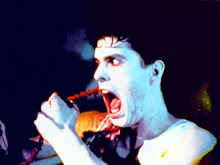
Directed by: Arthur Penn
Written by: Marc Shmuger + Mark Malone
Starring: Mary Steenburgen, Roddy McDowell, Jan Rubes, William Russ, Ken Pogue, Wayne Robson, Mark Malone
Mary Steenburgen plays Katie, a down on her luck actress who is told that she is being considered to take over a film role that was being played by someone else who greatly resembles her. The casting director (Roddy McDoweel) tell her that the first actress had a breakdown and ran away from the set. She is taken to a snowbound country house in remote upstate New York to film an audition tape for the eldery, wheelchair bound producer (Jan Rubes.) After she arrives, things begin to look as if they are not what they seem. Katie soon realizes she is in incredible danger and attempts escape.
With a premise straight out of a 40's suspense melodrama, I didn't expect much from this film. Like most bad thrillers, the most entertaining portions of the film occur in the last twenty minutes, after the damsel in distress finally pieces things together and has to fight for her life. But the majority of the movie is just tedious set-up and scenes of Katie acting like an idiot as she uncovers what her hosts are really up to.
Is she so desperate for a job that she'd go to a remote house out in the country with a complete stranger, just to shoot an audition tape? If you see your drivers license burning in a fireplace, would you not automatically question your hosts? The movie is filled with situations where Katie is forced to do something stupid in order to move the story along. I've seen this so many times in so many of these kinds of movies, but at least sometimes it's exciting. Not here.

Like I said, things pick up in the last act. When Katie's evil Doppelgänger shows up, things get interesting, mainly because we get to see Steenburgen play two different roles, one timid and afraid, the other heartless and evil. Unfortunately for the film, but not for me, their final confrontation is so absurdly shot and choreographed, the scene intended to be tense turns out to be hilarious camp straight out of a Joan Crawford or Bette Davis thriller from the twilight of their careers.
To sum things up the movie isn't a complete disaster, it's just too derivative of films of the past, and doesn't add anything new to the 'woman in distress' thriller sub-genre. Steenburgen is pretty good, even if her character can be a complete idiot at times, and Roddy McDowell has some demented fun when the shit finally hits the fan during the climax.
Final Verdict: See It (if you don't mind cliches.)




























